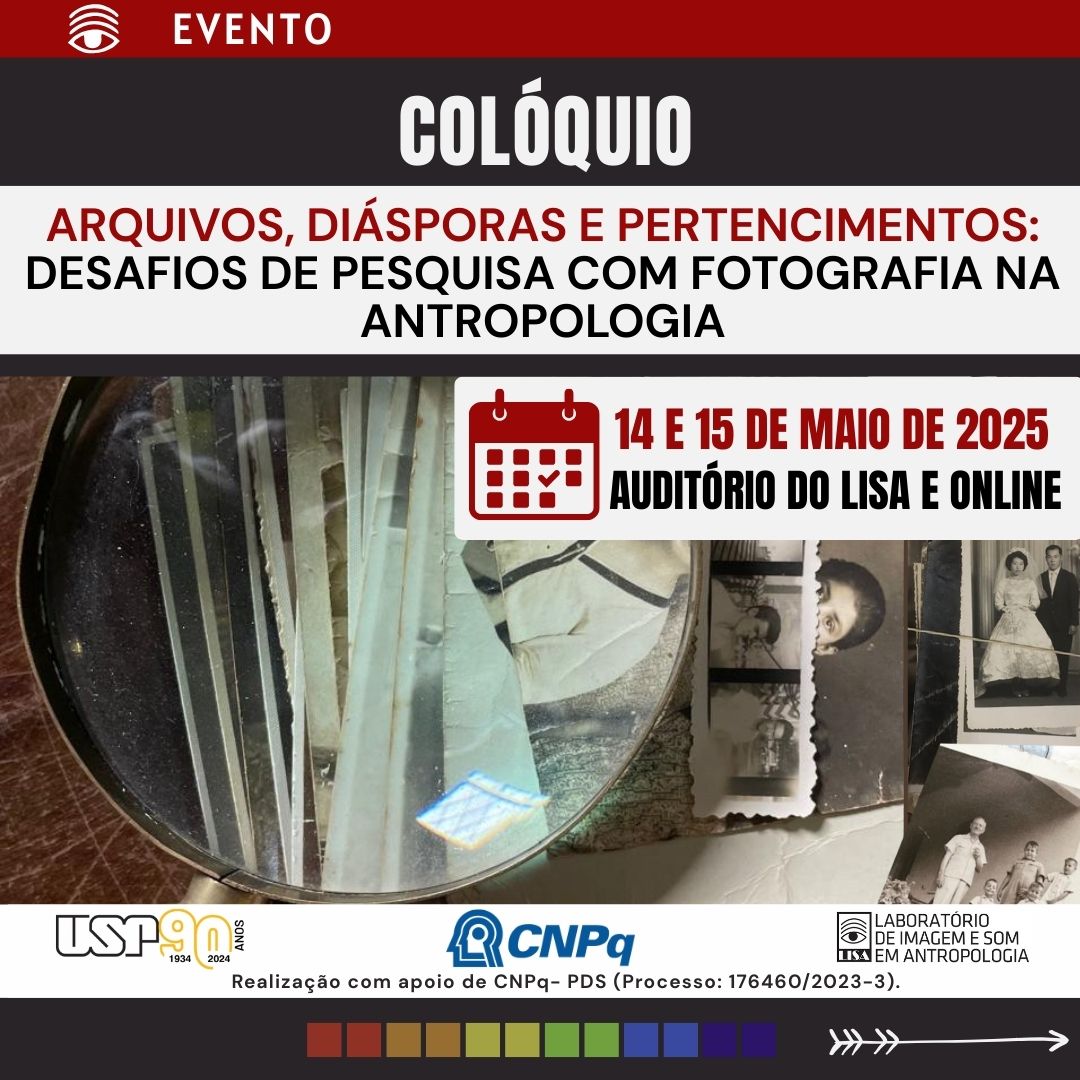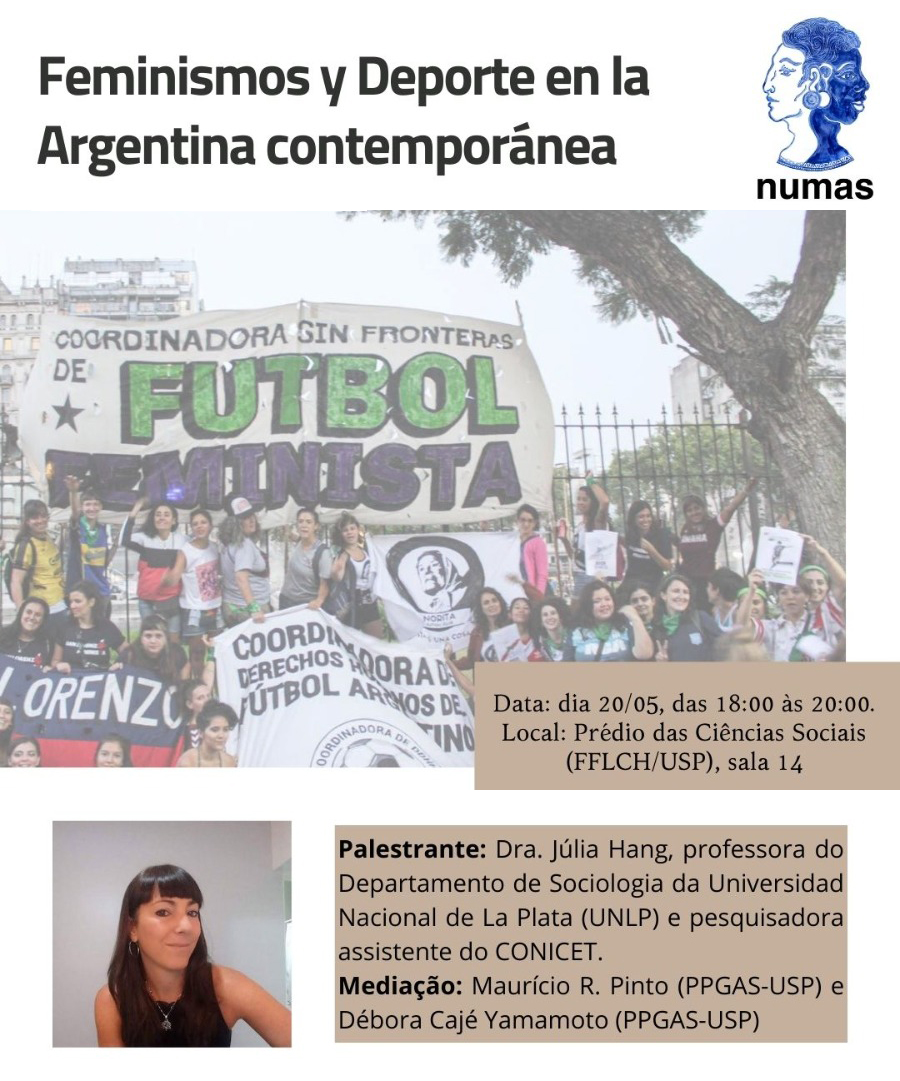Events DA
From May 14 to 15, 2025, LISA-USP will host the colloquium "Archives, diasporas and belongings: research challenges with photography in anthropology", organized by Fabiana Bruno, a senior postdoctoral fellow at CNPq. The event will feature two panels and two research workshop sessions. The colloquium will be opened by Sylvia Caiuby Novaes (GRAVI-USP) and the first panel "Family archives, orphan archives and other emerging photography collections" will feature the participation of Paula Roush (Found Photo Foundation - London South Bank University); Clarice Ehlers Peixoto (INARRA-UERJ); Fabiene Gama (NAVISUAL – UFRGS) and Oscar Guarín Martinez (SENSOLAB - Pontifical Javeriana University) and will be mediated by Suely Kofes (PPGAS- IFCH, LA’GRIMA-Unicamp).
The second panel, “Archives, platforms and other artifacts: diasporas and image belongings,” will feature Cornelia Eckert and Ana Luiza Carvalho da Rocha (NAVISUAL and BIEV-UFRGS); Andrea Barbosa (VISURB-Unifesp); Mariana Petroni (LA’GRIMA-Unicamp; Unilab) and Edgar Teodoro da Cunha (NAIP-Unesp), mediated by Tatiana Lotierzo (postdoc USP). The panels will be coordinated by Fabiana Bruno (GRAVI-USP; LA’GRIMA- Unicamp).
Professor Julia Hang (Universidad Nacional de La Plata, Argentina)
Professor in the Department of Sociology at Universidad Nacional de La Plata (UNLP) and assistant researcher at CONICET. Moderation and debate: Mauricio Rodrigues Pinto and Débora Cajé Yamamoto
broadcast on the FFLCH YouTube channel
The lecture will address the intersections between gender, sports and politics, based on a reflection on how Argentine feminism has put pressure on the world of sports in recent years. The case of female fans, athletes, managers and club members who have organized themselves politically to change sports, thus also transforming Argentine society, will be presented.
TALK WITH PAULO MAIA
(UFMG School of Education and post-doctorate DA/USP)
The Encyclopedia of Anthropology will celebrate its 10th anniversary in 2025! This date calls for celebrations, but above all for assessments and reflections on the work carried out in order to plan future projects.
In this sense, we invite the public to the roundtable "Digital encyclopedias in action: crafts, technologies, collaborations", organized in partnership with the Ethnographic Laboratory of Technological and Digital Studies at USP.
The event will bring together scientific dissemination projects for an exchange of experiences on the production of digital encyclopedias, considering the challenges of collaborative management, editing and writing. In addition to EA, we will talk about the encyclopedias Indigenous Peoples in Brazil, from the Socioenvironmental Institute, and Bérose - encyclopédie internationale des histoires de l’anthropologie; and also about workshops on creating and editing Wikipedia entries, which have been held at the university, promoted by Wikimedia Brasil.
In this talk, I present the first reflections of an ongoing research project dedicated to investigating the processes of elaboration of gendered bodies among the Tupi peoples of the sixteenth century. By tracing the vocabulary of substances abundantly present in the chroniclers’ accounts—references to blood, semen, cauim, puba, among others—I seek to evoke echoes of a cosmopolitics of substances, in which gendered bodies were formed by voluntary, collective, and densely conceptualized acts. In this first approach, I propose a panoramic view: I begin with the role of substances and their flows in the rituals of post-menarche and post-homicide seclusion, which aimed at the formation of adult male and female bodies, and I conclude with a reflection on some figures that escaped the binary colonial technology of genders used by the chroniclers: the transgender figures “tebira” and “çacoaimbeguira,” the young “panema” and the old “uainuy.”
In Brazil, as in other dimensions of the Highlands and Lowlands of the Amerindian scenario and context, each indigenous ethnic group has a specific, particular, independent and interdependent model of social organization guided by ethnic-wide methodologies that allow for a life followed by self-identification. Therefore, from the point of view of the ethnic scenario of Brazilian indigenous cultures, patrilineal systems and matrilineal systems prevailed as the foundations of self-identification of an ethnic group. More than being systems, they are in fact educational methods of a sociocultural framework. Given the scenario in which the demands of ethnic identifications become fundamental in the face of public policies and academic policies, necessary and differentiated as aspects of indigenous law, we intend to approach the theme Hierarchy and system of social organization: the Tukano kinship machine, as a way of providing debate based on the reading of the Tukano social organization experienced as an educational methodology and as a machine of indigenous social organization in the context of the northwest Amazon.







